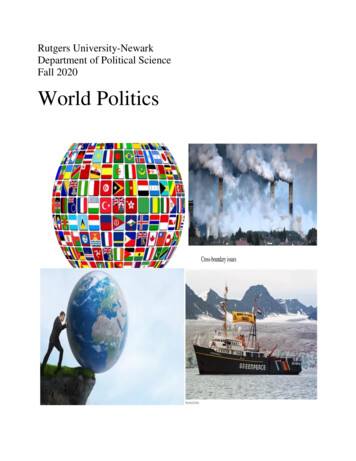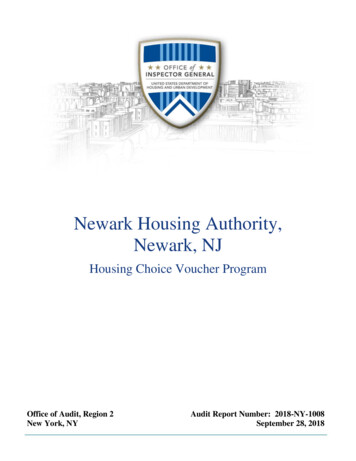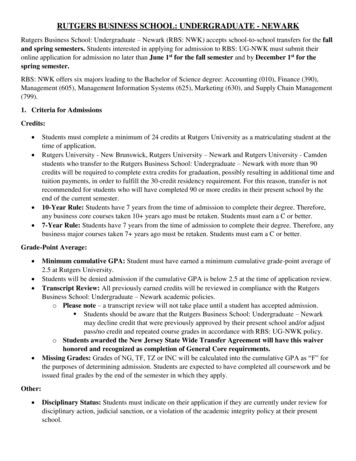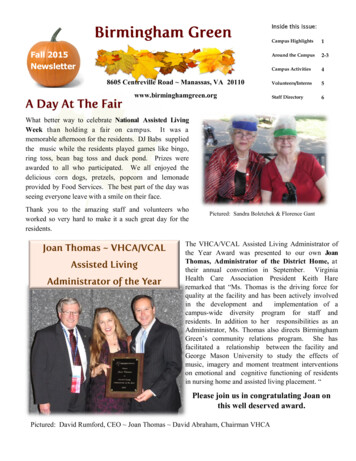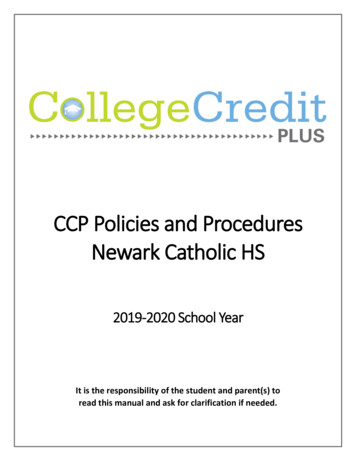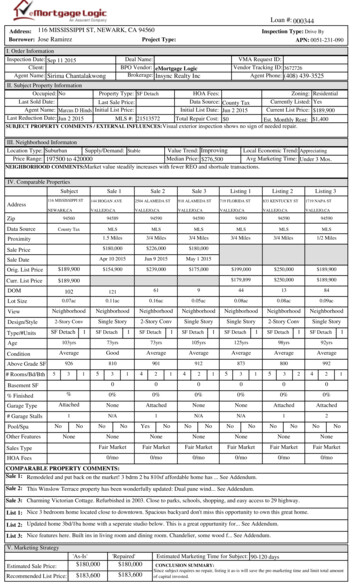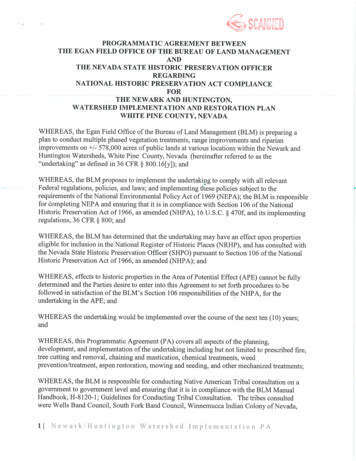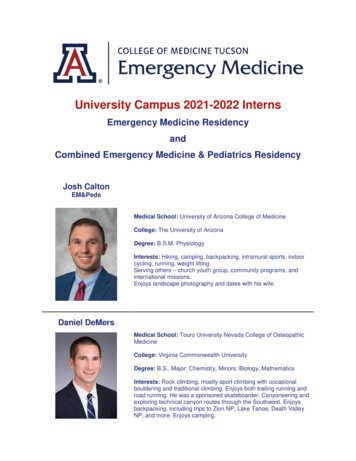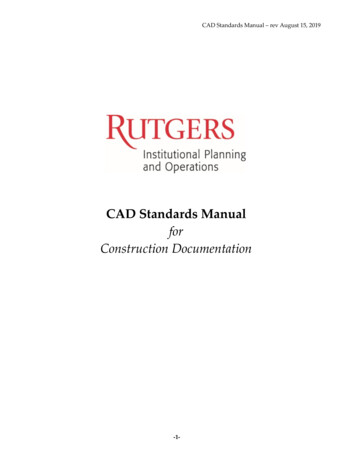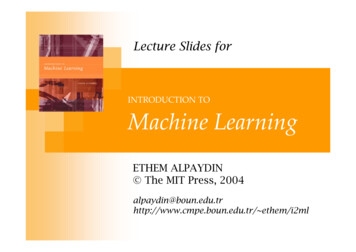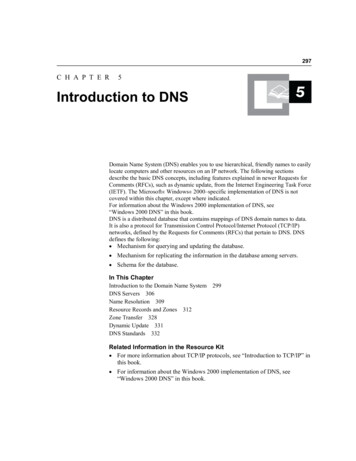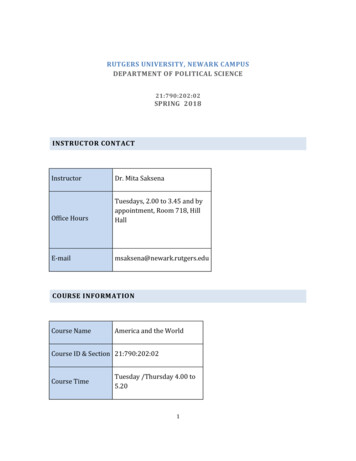
Transcription
RUTGERS UNIVERSITY, NEWARK CAMPUSDEPARTMENT OF POLITICAL SCIENCE21:790:202:02SPRING 2018INSTRUCTOR CONTACTInstructorDr. Mita SaksenaOffice HoursTuesdays, 2.00 to 3.45 and byappointment, Room 718, HillHallE-mailmsaksena@newark.rutgers.eduCOURSE INFORMATIONCourse NameAmerica and the WorldCourse ID & Section 21:790:202:02Course TimeTuesday /Thursday 4.00 to5.201
Semester/YearLocationSPRING 2018Bradley 313COURSE OVERVIEWWhat is the role of America in a dynamic and changing world? What kind of historicalevents, domestic factors, and international influences have shaped its present foreignrelations with the world? What are the transnational threats and challenges in theworld it needs to address? The course on America and the World will cover thehistory and evolution of American foreign relations from the nation’s early years as anew republic through the 21st century, exploring factors that have shaped its foreignpolicy and relationship with the world, ways in which America has influenced theworld- culturally, socially, economically and how different world events, rise ofidentity politics, globalization, transnational networks, and internationalorganizations have in turn shaped it’s policies and perception of the world. Thecourse is divided into three parts.The first part deals with theoretical approaches, the historical context and keydebates in the evolution of American foreign relations. We seek to ask the question ifUnited States was an isolationist power or was it an empire in the making pursuingits power, profit, prestige and principles. The second part of the course discussesAmerican foreign relations in the post Cold War era. It focuses on US pursuit of apolicy of liberal hegemony and assesses failures and successes of American foreignrelations. The third part of the course deals with US foreign relations since September2001 and the major transnational threats it is faced with.LEARNING OUTCOMES2
Student Specific: The course will help students focus and direct their efforts inexamining history and evolution of American foreign relations since it attained itsindependenceStudent Centered: Students are expected to complete all weekly readings andassignments to critically evaluate America’s role in the worldObservation and actionable: Students will be able to master and explore diversestreams of thought and economic and strategic interests that have shaped itsforeign policy and relationship with the world and exploring and assessinginternational influences and actors that in turn impact American foreign relationsDevelopmental: the students will be able to comprehend and evaluatetheoretical approaches to American foreign relations and apply them to currentconcerns and be able to create their own arguments and policy options whenmaking sense of America’s contemporary policies and transnational securitythreats. Students will develop “critical-thinking and writing skills required forcivic engagement in a democratic society and enables them to pursue careers inthe public, non-profit, and private sectors or to pursue further study in politicalscience, law, public service and administration, criminal justice, non-profitadministration, global politics, and international relations.” (Rutgers PoliticalScience Website)COURSE REQUIREMENT, ASSIGNMENTS AND GRADING All assignments- group projects, weekly readings, slides and videos, researchpaper, mid-term and final exams are aligned to the course learning objectivesand make the expected learning outcomes measurable Attendance and Participation: Regular attendance and participation isrequired for all scheduled classes. Students must do the assigned readings andcome to class with questions, and contribute to classroom discussions.Absence from classes will affect your grade. Group Projects: Students will work in groups they will be assigned to . Formore details, check blackboard. Research Paper: This course requires you to write a short 5-page researchpaper. Very broadly the paper asks you to identify a region or a country, assessand analyze US foreign policy towards the country or region. The final paperis due for submission in blackboard on 04/26/18 by 11.59P.M. Late paperswill not be accepted. A one paragraph written statement about the topic you3
wish to pursue is due by 02/ 20/18 in blackboard. All students must completethe first draft of their research paper by 03/27/18. Students will also do a peerreview of each other’s work in class on 03/27/18. Peer review sheet is postedin blackboard. Final Exam: The final exam will be administered during the time listed on theofficial Rutgers University final exam grid. The test will comprise of multiplechoice questions, and short answers. The final exam is tentatively scheduledfor Monday, May 7, 2018 at 11.45 and will comprise of 100 multiple choicequestions including short answer questions. We will review for the final examin class on 04/30/18 The grading scale is displayed in the following tableAttendance10 %GroupProjects20%IndividualResearchPaper 125 %Participation15%Final Exam30%4
Letter GradePointsA90 – 100 pointsB 86 – 89 pointsB80 – 85 pointsC 76 – 79 pointsC70 – 75 pointsD60 – 69 pointsF59 and belowCOURSE POLICIES Absence Policy: In accordance with University policy, students are expectedto attend class every day with all relevant required course materials and work.If you are absent from class, contact me as soon as possible, preferably beforethe next class meeting. Students remain responsible for any missed work, forwork completed in class, and for work due, and must arrange for that work tobe delivered to the faculty on time. Per the university policy, absences areexcused only in the case of illness, death in the family, religious observance, orofficial college business. These instances must be documented and approvedin advance when the instance was foreseeable. Note: having an airline ticketto travel (unless it is for one of the documented reasons listed above) is notgrounds for an excused absence. Blackboard: Please check the blackboard for readings and announcements. Completion of Requirements: You should complete ALL the requirements ofthe course. If you do not submit an assignment or appear for yourpresentation, you will automatically fail the course. If you foresee anyproblems with the timely submission of assignments and/or appearing foryour presentations, you must notify me immediately. All assignments are dueat the beginning of the class meeting.5
Make-Ups for Presentations and Examinations: Students who miss class onthe date they were scheduled to make their presentation will not be able tomake it up on another date, unless the absence was documented and excusedin accordance with the university policy outlined above. Students will not beallowed to make up the mid-term or final exams on another date unless theabsence was documented and excused in accordance with the universitypolicy outlined above. Use of Electronic Devices: Please turn off all cell phones and personalelectronic devices when you enter the classroom. You can use laptops, but onlyfor taking notes. Note that your class participation grade will automaticallydrop to an F if you use your phone or laptop for a non-classroom relatedactivity. Email Communication: Outside of the classroom, the primary method ofcommunication will be via emails, sent either directly or via Blackboard. It isyour responsibility as a student in this course to ensure that your Rutgersemail ID is operational to receive my emails to you. Contact the TechnologyHelp Desk immediately if you experience problems in receiving emails fromme. Disruptive Student Behavior: Students who engage in any prohibited orunlawful behavior that results in disruption of class may be directed by theinstructor to leave the class for the remainder of the class period. As a lastresort, if a disruptive student refuses to leave the room, campus Public Safetywill be contacted for assistance at 973-353-5581. Inclement Weather Policy: If classes are canceled due to inclement weather,students are responsible for checking their university email and/orBlackboard for information from their faculty advising them of any immediateimpact on the students’ preparation for the next class meeting. Academic Integrity: All students must sign an academic documents/AI Policy 9 01 2011.pdf. “On my honor, I have neither received nor given any unauthorizedassistance on this examination (assignment).” All students are expected toadhere to the university academic integrity policy. Please uments/AI Policy 2013.pdf6
Syllabus and Course Requirements: Finally, you are responsible forunderstanding and acting upon the contents and requirements of this syllabus.If you have any questions regarding any aspects of this syllabus, feel free towrite or talk to me. Also, if you have questions or concerns regarding yourperformance in the course or on a project, I encourage you to schedule anappointment with me during my office hours. You can also seek academicsupport from the places mentioned below.ACADEMIC SUPPORT ON CAMPUS John Cotton Dana Library (http://www.libraries.rutgers.edu/dana): DanaLibrary is a gateway to a variety of information resources. The home page ofthe library provides 24/7 access to online databases of articles, e-journalcollections, e-books, and specialized information to support your coursework. academicsupportoncampusCOURSE SCHEDULE AND ASSIGNED READINGSNote: For each day, complete the readings in the order listed.PART 1: AMERICAN ROLE IN THE WORLD IN HISTORICAL CONTEXT(1620-1989): KEY CONCEPTS, KEY EVENTS, AND THEORETICALDEBATES01/18: INTRODUCTION, WELCOME AND COURSE OVERVIEW Broad Framework- Power, Prestige, Prosperity, PrinciplesStephen Walt, Making the Grade. Is There a Way to Judge Foreign Policy? (onBB)01/23: APPROACHING THE STUDY OF AMERICAN FOREIGNRELATIONS: SYSTEMIC CONTEXT Chapters 2and 3 Jentleson(on BB)Chapter 1, Merrill and Paterson (on BB)7
John Lewis Gaddis, Two Cold War Empires: Imposition vs. Multilateralism inMerrill and Paterson(on BB)Gerhard Weinberg, The Global Threat and the Case for War in Merrill andPaterson (on BB)01/25: APPROACHING THE STUDY OF AMERICAN FOREIGNRELATIONS: SYSTEMIC CONTEXT Chapters 2and 3 Jentleson(on BB)Chapter 1, Merrill and Paterson (on BB)US entry into WW1 and WW2(on BB)01/30: 1776- 1945- APPROACHING THE STUDY OF AMERICANFOREIGN RELATIONS: DOMESTIC CONTEXT Monroe Doctrine(BB)Farewell speech George Washington BB)Roosevelt corollary(BB)Woodrow Wilson The World League for Peace(BB)02/01: APPROACHING THE STUDY OF AMERICAN FOREIGHRELATIONS: DOMESTIC CONTEXT-ROLE OF INTEREST GROUPS,MILITARY INDUSTRIAL COMPLEX AND MEDIA Why We Fight (on BB)Interest Groups- American Jewish Lobby (on BB)02/06: APPROACHING THE STUDY OF AMERICAN FOREIGNRELATIONS: DOMESTIC CONTEXT Stephen Walt Role of Think Tanks (on BB)02/08: HISTORICAL CONTEXT: ISOLATIONISM/ EMPIRE IN MAKING? Age of Empires (on BB)8
02/13: COLD WAR LESSONS AND LEGACIES Case Study Middle EastPART 2: AMERICAN STRATEGY IN POST COLD WAR ERA (1989-2001)02/15: UNIPOLAR WORLD? UNILATERALISM VS MULTILATERALISMGRAND STRATEGY FOR NEW ERA Case study Persian Gulf War (on BB)Chapter 7, pages 286-300, 315-327 in Jentleson(on BB)02/20: UNIPOLAR WORLD? UNILATERALISM VS MULTILATERALISMGRAND STRATEGY FOR NEW ERA The (Clinton) White House, A National Security Strategy of Engagement andEnlargement (1995)The (Bush) White House, The National Security Strategy of the United Statesof America (2002)The (Obama) White House, National Security Strategy (2015) One paragraph research topic due02/22: US LED GLOBALIZATION/ LIBERALIZATION LIBERAL ORDER INMAKING D. Deudney and G. J. Ikenberry, “The Nature and Sources of LiberalInternational Order,” Review of International Studies, April 1999(on BB)Michael Hunt(onBB)9
BBC Report: How Bretton woods Shaped the World (on BB)02/27: US LED GLOBALIZATION/ LIBERALIZATION LIBERAL ORDER INMAKING Peter Goodman, What Fuels Backlash Against Free Trade,” TheNew York Times, September 28, 2016(on BB)Thomas Friedman, The Lexus, and Olive Tree, online athttps://www.youtube.com/watch?v l9hO2horkwc (on BB)03/01: RESEARCH PAPER, RESEARCHING ONLINE DATABASES,CITATION STYLES03/06: AMERICA AND HUMANITARIAN INTERVENTION Case Study Libya and Somalia Richard Betts, “The Habit of American Peace: From Cold War toHot Peace,” Political Science Quarterly, Vol 127, 3(2012) (on BB) US Libya relationshiphttps online at://www.youtube.com/watch?v MkkjJRr2Its(on BB)Fault lines- US Intervention in Libya online athttps://www.youtube.com/watch?v b5EeuEg349o (on BB)Ignatieff- Responsibility to Protect online athttps://www.youtube.com/watch?v w3UCGqW6lus (on BB) 03/08: AMERICA AND HUMANITARIAN INTERVENTION: FROMHUMANITARIAN INTERVENTION TO RESPONSIBILITY 2 PROTECT 03/10-03/18 Spring Break03/20: CHALLENGES TO US: GROWTH OF ECONOMIC POWER HOUSES10
Watch Documentary- Death by China (on BB)The Rise of China and the BRICS: A Multipolar World in theMaking at ltipolar-world-makingS. Brooks and W.C. Wohlforth, “The Once and Future Superpower:Why China Won’t Overtake the United States,” Foreign Affairs 95,no. 3 (May/June 2016).03/22: CHALLENGES TO UNITED STATES: GROWTH OF ECONOMIC POWERHOUSES Case Study India and Brazil (on BB)03/27: IN CLASS PEER REVIEW- PEER REVIEW SHEET INBLACKBOARDPART 3: AMERICAN FOREIGN RELATIONS AND TRANSNATIONALCHALLENGES 2001 -201803/29: USA AND CYBERSECURITY04/03: BUSH NATIONAL SECURITY STRATEGY AND WARS IN IRAQAND AFGHANISTAN National Security Strategy 2003, 2006(on BB)11
04/05: COUNTER TERRORISM: NATIONAL SECURITY VS. CIVILLIBERTIES Chapter 6 in Contemporary Foreign Policy by Mansbach and Taylor (on BB)04/10: USA AND NUCLEAR NON-PROLIFERATION Non Proliferation Treaty (on BB)USA and North Korea (on BB)04/12: USA AND IRAN NUCLEAR DEAL Brookings Institute: Debating the Iran Nuclear Deal (on BB) Eric Lorber, “President Trump and The Iran Nuclear Deal,” Foreign Policy,November 16, 2016(on BB) Explaining Iran Nuclear Deal in 3 minutes (on BB)04/17: AMERICA AND GLOBAL INFECTIOUS DISEASES preparedness-and-response/(onBB) The Return of Infectious Disease- Laurie Garrett (on BB) Obama Declares Ebola a national security threat (on BB)04/19: US FOREIGH POLICY AND US ROLE IN THE WORLDASSESSMENT: DONALD TRUMP D. Trump, “Transcript to Donald Trump’s ‘America First’ ForeignPolicy Speech,” April 27, 2016S. Sestanovich, “The Brilliant Incoherence of Trump’s Foreign Policy,”The Atlantic Monthly, May 2017 (on BB)12
04/24: US FOREIGH POLICY AND US ROLE IN THE WORLDASSESSMENT: WHAT NEXT Joseph Nye, “The Future of American Power,” Foreign Affairs, Vol. 89, No. 6,pp. 2-12, 2010(on BB)Robert Kagan, “Superpowers do not get to Retire,” New Republic, 2014(onBB)Ian Bremmer, Three Choices for America’s Role in the World (on BB)Robert Kagan, The Twilight of the Liberal World Order (on BB)Final Research Papers due for submission in blackboard by 5.00 pm.04/26: REVIEW FOR FINAL EXAM13
administration, global politics, and international relations. (Rutgers Political Science Website) COURSE REQUIREMENT, ASSIGNMENTS AND GRADING All assignments- group projects, weekly readings, slides and videos, research paper, mid-term and
